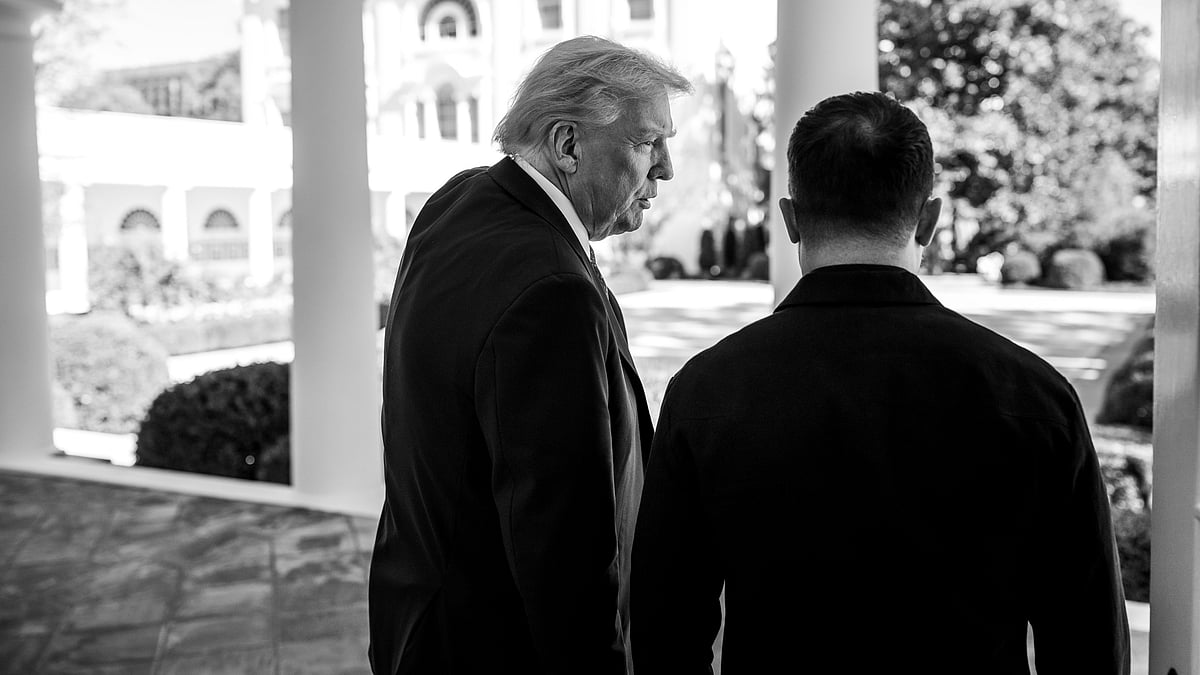World
Donald Trump urges Russia, Ukraine to ‘stop’ war, ‘let both claim victory’
Meeting with Zelenskyy was cordial; urged him and Putin to stop the killing and make a deal, says US president

In a day thick with diplomacy and drama, US President Donald Trump hosted Ukrainian President Volodymyr Zelenskyy at the White House — barely 24 hours after a marathon two-and-a-half-hour phone call with Russian President Vladimir Putin. The back-to-back outreach underscored Trump’s growing ambition to cast himself as the world’s chief dealmaker, poised to end the war that has scarred Eastern Europe for nearly three years.
After his meeting with Zelenskyy, Trump took to Truth Social, calling the encounter “very interesting and cordial,” and framing himself as the lone voice urging both warring sides to step back from the brink.
“The meeting with President Volodymyr Zelenskyy of Ukraine was very interesting and cordial,” Trump wrote. “But I told him, as I likewise strongly suggested to President Putin, that it is time to stop the killing, and make a deal!”
In classic Trumpian style, he went further — proposing that both nations simply “stop where they are” and “claim victory”, leaving history to judge.
“They should stop where they are. Let both claim victory, let history decide! No more shooting, no more death, no more vast and unsustainable sums of money spent,” he declared. “This war would never have started if I were President. Thousands are being slaughtered each week — no more. Go home to your families in peace!”
Published: undefined
During his media briefing before the bilateral meeting, Trump appeared to soften his earlier stance on supplying Tomahawk missiles to Ukraine. Once seen as a vocal proponent of arming Kyiv, he now struck a tone of weary pragmatism.
“We’re going to be talking about Tomahawks,” he said, “but I’d much rather have them not need Tomahawks. I’d much rather have the war be over. We are in it to get the war over.”
He added that the United States itself needed the missiles for its own security.
“We need Tomahawks. And we need a lot of other things we’ve been sending over the last four years to Ukraine,” he noted.
Zelenskyy, however, held firm. Echoing Kyiv’s persistent plea for long-range strike capability, he countered that Ukraine’s defense remains incomplete without Tomahawks, which could reach deep into Russian territory.
“Ukraine has thousands of our production drones, but we don’t have Tomahawks. That’s why we need them,” Zelenskyy said pointedly.
The two leaders’ differences extended beyond weaponry to their perceptions of Vladimir Putin. Trump — fresh from his lengthy phone call with the Russian president — maintained that Putin “wants to end the war”, while Zelenskyy flatly disagreed, insisting the Kremlin remained bent on conquest.
Trump, undeterred, insisted his diplomacy was working. He revealed that “great progress was made” during Thursday’s call with Putin and announced plans to meet the Russian leader in Budapest, Hungary, soon. A team of senior U.S. officials led by Secretary of State Marco Rubio is expected to meet Russian counterparts next week to prepare for a second Trump-Putin summit within three months.
Trump also used the occasion to highlight what he claimed was India’s retreat from buying Russian oil, crediting his diplomacy for the shift.
“India is not going to be buying Russian oil anymore,” he asserted. “They have already de-escalated, and they have more or less stopped; they are pulling back. They bought about 38 percent of the oil, and they won’t be doing it anymore.”
Published: undefined
Just two days earlier, Trump had said he was “assured” by Indian officials that such purchases would soon cease — though he acknowledged it “couldn’t be done immediately.”
Trump’s latest flurry of diplomacy follows his highly publicised but inconclusive summit in Alaska in August, where talks with Russia failed to yield an agreement. Now, emboldened by what he touts as a breakthrough in halting the Gaza conflict, he has turned his attention squarely to the war in Ukraine — a conflict he claims he could end “in 24 hours.”
When asked whether Putin might be merely stalling for advantage, Trump replied with characteristic bravado:
“I’ve been played by the best of them, but I always come out on top. I think he wants to make a deal. I made eight of them — I’m going to make a ninth.”
But his self-assured tone drew sharp rebuke in Washington. Congressman Gregory Meeks, Ranking Member of the House Foreign Affairs Committee, accused Trump of appeasing Moscow while abandoning Kyiv.
“This isn’t Trump bringing peace through strength; this is weakness through appeasement,” Meeks said. “He failed to deliver today on providing any support for Ukraine.”
As Trump strides deeper into the heart of global crises — part peace broker, part political showman — the world watches to see whether his brand of “dealmaking diplomacy” will yield real peace, or simply another headline in the theatre of geopolitics.
With IANS inputs
Published: undefined
Follow us on: Facebook, Twitter, Google News, Instagram
Join our official telegram channel (@nationalherald) and stay updated with the latest headlines
Published: undefined